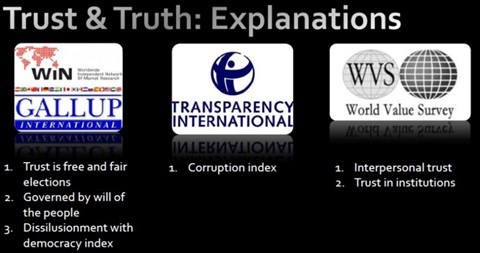The demand for trust and loyalty is growing from citizens globally, yet trust levels are diminishing, so international market researchers conducted the ultimate survey, asking whether polls can be trusted.
The World Independent Network of Market Research, WIN/Gallup International recently conducted a survey in 47 countries across 5 continents, with 42,720 interviews being conducted, to see if the global population agrees with Churchill's quote, "The only poll numbers I trust are the ones I falsified myself."
The results reveal that 50% of respondents somewhat trust polls that are published in their country, and 30% fully trusted these surveys. The disbelievers (15%) said that they did not trust polls and the remaining 5% did not know.
Categorising trust
The respondents were then grouped in three categories naïve, critical, and cynical.
The naïve group believe over 42% of polls and these trusting citizens came mainly from Nigeria, Morocco, UAE, Saudi Arabia and India. The critical mass, too numerous to list here, believed between 12% and 42% of polls. The cynical believed 11% and less of polls and came mainly from the Philippines, Sweden, Italy, Belgium, Iceland, Japan, Korea, UK, Argentina and France.
Next respondents were asked about their own honesty and integrity. When answering a survey, do they always, most of the time, rarely, or never provide a truthful answer. The poll showed that 59% of respondents could be trusted to always give a truthful answer (or so they say). The most trustworthy countries, where 74% percent of respondents were always honest in a poll, are Portugal, Italy, Brazil, Canada, Ireland, US, UK, Finland, Belgium and Bosnia. Less trustworthy citizens, where only 51% and less always told the truth in a survey, come from Turkey, Pakistan, Guatemala, Bulgaria, India, Iran, Kenya and the Philippines.
Globally 29% of respondents told the truth most of the time, 7% rarely told the truth, and 2% never told the truth. An interesting discovery was that the propensity to trust polls and tell the truth in them, was not related. It seems that something else is at play.
It appeared that the more likely citizens were to trust polls, the less likely they were to be truthful about their political views. The more likely citizens were to trust polls; the least likely they were to be truthful when answering morality questions. Citizens trust polls more when they are more likely to feel that elections are not free and fair and that their regimes are corrupt. Yet, citizens tend to be more truthful in polls when they are more likely to feel that elections are free and fair, and they are more disillusioned about democracy.
Trust and truthfulness
WIN/Gallup International, Transparency International and World Value Survey are the main global market research surveys that deal with trust and truthfulness.
The research revealed that interpersonal trust and trust in institutions do not necessarily align: Citizens tend to trust polls more when they already trust their government. On an interpersonal level, citizens are more likely to be truthful in polls if they also trust their neighbours. Yet, there is an intimate relationship between perceptions of corruption and feelings towards democratic processes (free and fair) and interpersonal trust.
Respondents were asked which nationalities they trusted the most. The results revealed that the Japanese were the most trusted by 17% of all respondents, Americans (15%), Germans (13%), Canadians (8%), people from the UK (7%), Russians (5%), French (4%) and lastly the Italians (3%).
Understanding what the world truthfully thinks is part art and part science. As market researchers, WIN/Gallup believes that it can achieve this goal and build it on foundation of trust. Click here for more information.


























